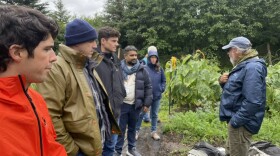In the parking lot of the Native Village of Port Lions office building, Joe Kewan counts out 26 individually frozen salmon fillets and one head of garlic from Marlene’s Garden, the farm in Larsen Bay, into a tote bag.

Then, he delivers them door-to-door in his hometown of Port Lions. He’s got pages of names in a checklist on his clipboard.
“Nancy, Marvin, there’s so many Nelsons here," Kewan said as he went over the list.
Within a few hours or so he had visited most of the 64 households on the list. Kewan said he knows where everyone lives, who’s home, who’s out of town, and who might be just taking a nap.
“I have to listen sometimes, too, cause they say, ‘come in’," he said as he knocked on an elder's door. "She might be taking her nap though.”

Max Lyons, the new program director for the Kodiak Archipelago Leadership Institute, said this fish distribution is possible through a federal Department of Agriculture program, the LFPA.
“A big supporter of it is has been our local food purchasing assistance agreement with the state, so that’s helped cover the cost of transport and admin time and also [to] purchase the fish directly from the Ivanoffs for distribution, free of charge," Lyons said.
The Ivanoffs, as in the fishing family that runs Ivanoff Seafood in Kodiak. KALI bought the frozen fillets from the Ivanoffs in Kodiak, then flew the fish to archipelago communities via Island Air’s bush planes.

KALI is a contractor the state uses to purchase produce, goods and food from six farms around the archipelago with USDA funds. Lyons said the institute got roughly $250,000 over three years to use among Kodiak archipelago communities.
He said buying the fish locally is part of the USDA's Local Food Purchase Assistance Cooperative Agreement program's goal to bolster local food security.
“To help stimulate local food production and prime the pump to get things going," Lyons said. "So it’s been a great assistance. It’s at this point not a long-term program, but it’s been great for the communities, the impact it’s had over the last three years.”
Port Lions was the final community out of three around the archipelago that received fish donations from KALI this year. They also distributed fish to Ouzinkie and Larsen Bay. The institute hopes to provide another fish distribution next year before the federal funding sunsets for KALI at the end of 2026.
Statewide, the USDA committed nearly $14 million of federal money to tribal governments in Alaska in addition to another $1.5 million to the state Division of Agriculture for this program since 2022. The USDA cut hundreds of millions of dollars in funding to the Local Food Purchase Assistance Cooperative Agreement program and the Local Food for Schools Cooperative Agreement program earlier this year.
For some, like the Tyonek Tribal Conservation District’s Tyonek Gather program, the sunsetting of future LFPA funding forced them to terminate a local food program after Oct. 31 according to the Alaska Food Policy Council.







